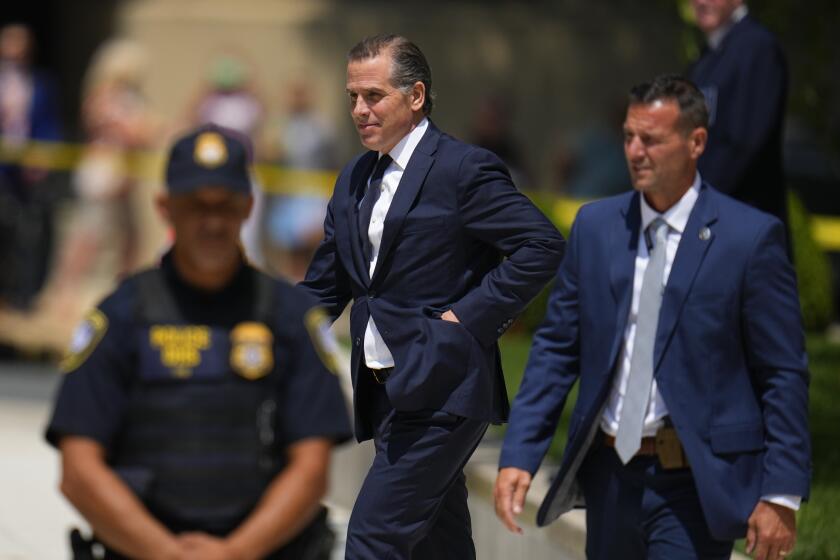Column: Hunter Biden isn’t being accused of any new wrongdoing. So why was he just indicted again?

- Share via
It’s not necessarily sinister for a prosecutor to go from offering an attractive plea deal to a defendant to throwing the book at him. Plenty of defendants have seen that happen after they turn down a plea bargain or authorities turn up new evidence.
But the reasons for the dramatic shift in Hunter Biden’s case are more unusual and troubling.
Under a nine-count indictment brought by special counsel David Weiss in Los Angeles last week, Biden faces new and far more serious charges for the very same conduct that was the subject of a favorable plea agreement in July. The deal would have required the president’s son to plead guilty to two misdemeanor tax violations while dismissing a gun charge if Biden could stay out of trouble for a year.
President Biden’s son wouldn’t have been charged if Republicans in Congress weren’t looking to advance Donald Trump’s prospects by disingenuous means.
The collapse of that deal is one reason for the new charges against Biden. Sloppy lawyering on both sides resulted in an agreement that seemed to require the judge to decide whether to bring or dismiss the gun charges, a quintessentially executive function that could violate the separation of powers. She rightly balked, and the parties couldn’t put the pieces back together.
The important point is that the unwinding of the bargain had nothing to do with Biden. He was in effect an innocent bystander to the breakdown.
Biden’s second bad break was a function of the Department of Justice’s special counsel regulation and Atty. Gen. Merrick Garland’s determination to remain — and appear — apolitical.
Donald Trump and other Republicans have criticized the Justice Department deal with President Biden’s son on tax and gun charges. They’re off-base as usual.
The department is committed to the principle that like defendants should be treated alike. If a line prosecutor proposes to charge a crime either far more harshly or far more leniently than in previous cases, she had better have a compelling reason. The department’s many-tiered supervisory structure is tasked with ensuring the consistency that is a hallmark of equal justice. Even a U.S. attorney — the position Weiss previously held under former President Trump and President Biden — may be overruled in a high-profile case if he departs from standard practice.
That supervisory structure was irrelevant here, however. Once Weiss asked for special counsel status and Garland granted it as of August, he gained a fiefdom within the department where no one could second-guess his decisions.
The consequences were enormous for Biden. I have looked long and hard without finding such a tough case against another defendant like him — that is, one who failed to pay taxes while in the depths of substance abuse and later paid them back with interest and penalties.
This suggests a serious abuse of prosecutorial discretion. Weiss may have the raw power to charge the case as he did, but doing so violates the core principle of treating like defendants alike.
That brings us to the third and most unnerving potential reason for the new federal case against Biden. The maximalist indictment, which includes all manner of gratuitous swipes at Biden’s dissolute conduct in the throes of drug addiction, comes after Republicans in Congress savagely attacked Weiss over the prospective plea deal.
A number of House Republicans want to see Hunter Biden in the stocks. It goes without saying that such partisan blood lust has no place in federal charging decisions.
But it gets worse. Republicans in Congress are trying to use the new charges to help justify an impeachment investigation of President Biden — notwithstanding the absence of any persuasive evidence tying the president to his son’s misconduct.
It would be controversial but not unheard of to target one family member to get at the criminal conduct of another. It would be beyond the pale to do so in the service of a highly dubious political endeavor such as the move toward impeaching President Biden.
Hunter Biden’s lawyer, Abbe Lowell, reacted to the charges with indignation, promising to put the government on trial. The problem is that the law provides very little room to challenge the probity of prosecutorial decisions. Claims of vindictive prosecution are restricted to narrow conditions that don’t apply here.
Hunter Biden has been to hell and back in recent years. He may be headed that way again through no fault of his own — and for reasons that appear to be nakedly political.
Harry Litman is the host of the “Talking Feds” podcast. @harrylitman
More to Read
A cure for the common opinion
Get thought-provoking perspectives with our weekly newsletter.
You may occasionally receive promotional content from the Los Angeles Times.













